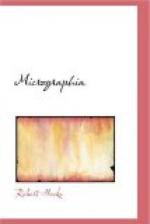running over, indure to be inclin’d to an
Angle, equal to that of the greatest refraction of
Water, and no more, without running over.
The Ruler EF was fixt very fast to the Pipe V,
so that the Pipe V directed the length of the Ruler
EF, and the Box and Ruler were mov’d on the
Pin TT, so as to make any desirable Angle with
the Ruler AB. The bottom of this Pipe V was stop’d
with a small piece of exactly plain Glass, which
was plac’d exactly perpendicular to the
Line of direction, or Axis of the Ruler EF.
The Pins also TT were drill’d with small
holes through the Axis, and through those
holes was stretcht and fastned a small Wire. There
was likewise a small Pipe of Tin loosly put on
upon the end of V, and reaching down to the sight
G; the use of which was only to keep any false
Rayes of light from passing through the bottom of V,
and only admitting such to pass as pierced through
the sight G: All things being placed together
in the manner describ’d in the Figure; that is,
the Ruler AB being fixt perpendicular, I fill’d
the Box CC with Water, or any other Liquor, whose
refraction I intended to try, till the Wire passing
through the middle of it were just covered: then
I moved and fixt the Ruler FE at any assignable
Angle, and placed the flame of a Candle just against
the sight G; and looking through the sight I, I moved
the Ruler RS to and fro, till I perceived the light
passing through G to be covered, as ’twere,
or divided by the dark Wire passing through PP:
then turning the Screw in K, I fixt it in that posture:
And through the hole S, I observed what degree
and part of it was cut by the cross threads in
S. And this gave me the Angle of Inclination, APS
answering to the Angle of Refraction BPE:
for the surface of the Liquor in the Box will
be alwayes horizontal, and consequently AB will be
a perpendicular to it; the Angle therefore APS
will measure, or be the Angle of Inclination in
the Liquor; next EPB must be the Angle of Refraction,
for the Ray that passes through the sight G, passes
also perpendicularly through the Glass Diaphragme
at F, and consequently also perpendicularly through
the lower surface of the Liquor contiguous to
the Glass, and therefore suffers no refraction till
it meet with the horizontal surface of the Liquor
in CC, which is determined by the two Angles.
By means of this Instrument I can with little trouble, and a very small quantity of any Liquor, examine, most accurately, the refraction of it not only for one inclination, but for all; and thereby am inabled to make very accurate Tables; several of which I have also experimentally made, and find, that Oyl of Turpentine has a much greater Refraction then Spirit of Wine, though it be lighter; and that Spirit of Wine has a greater Refraction then Water, though it be lighter also; but that salt Water also has a greater Refraction then fresh, though it be heavier: but Allum water




